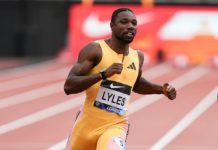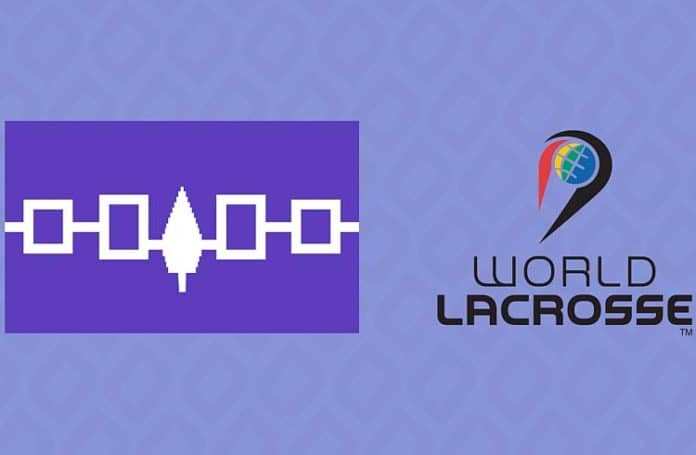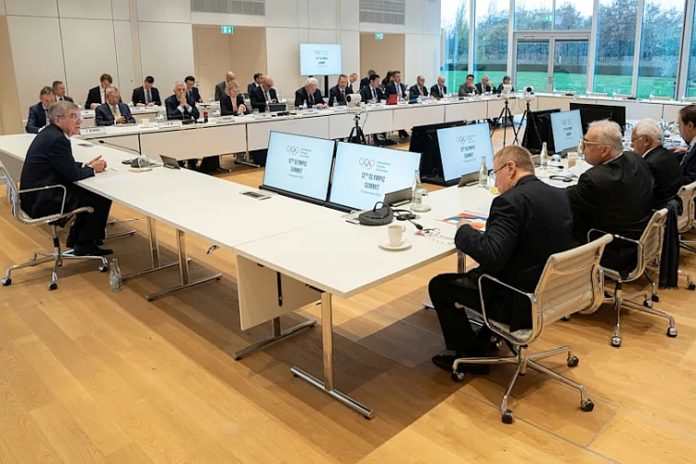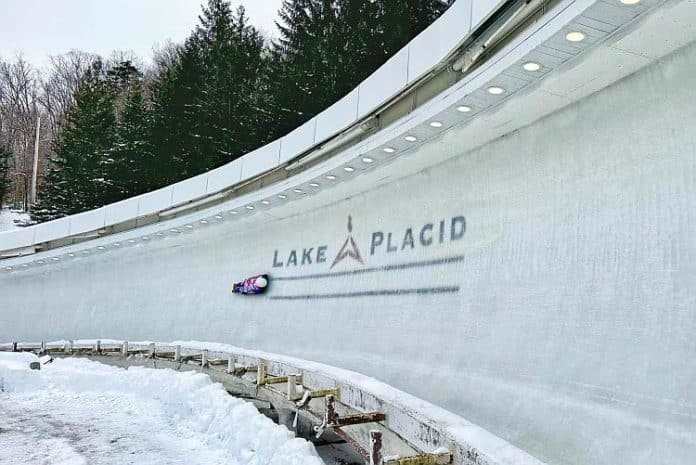★ The Sports Examiner: Chronicling the key competitive, economic and political forces shaping elite sport and the Olympic Movement.★
★ To get The Sports Examiner by e-mail: sign up here! ★
≡ THE 5-RING CIRCUS ≡
1. Biden backs Haudenosaunee Confederacy team for LA28
2. Italian ministers still insisting on Cortina for sliding track
3. NHL concerns about 2026 focused on new arena
4. IOC’s Dubi explains France 2030 Winter venue shuffling
5. Germany to advance bid plans for 2036 or 2040 Games
● U.S. President Joe Biden announced support for the Haudenosaunee Nationals to be able to compete as a team in the LA28 Olympic lacrosse tournament, despite the players being from both the U.S. and Canada. Inspirational, but not likely.
● Despite direct instructions from the International Olympic Committee, Italian ministers continue to toy with the idea of having a bobsled, luge and skeleton run in Cortina for the 2026 Winter Games, despite no company having bid on the project earlier this year.
● Construction concerns in Milan Cortina are also worrying the National Hockey League, which has not yet determined whether its players will participate in the 2026 Winter Games, notably in view of the main ice hockey arena not expected to be finished until the end of 2025! And there are other issues.
● IOC Executive Director for the Olympic Games, Christophe Dubi, explained why the French Alps bidders for the 2030 Winter Games are being pushed to re-arrange their venue plan as the “dialogue” part of the “targeted dialogue” process gets going in earnest.
● The German sports confederation (DOSB) unanimously agreed to work towards a plan to bid for a future Olympic Games, possibly as soon as 2036, or for 2040, or for Winter Games in 2038 (if the Swiss fail) or 2042. Is a 2036 bid realistic, a century after the 1936 Nazi Games?
● Panorama: Paris 2024 (French authorities promise scrutiny over pricing violations) = Athletics (2: Indian sprinter who ran alone caught for doping; Nike rescues UK Athletics) = Diving (Schnell, Gibson, Hedberg collect two wins each at Winter Nationals) = Figure Skating (Hersh notes Grand Prix scoring down in women’s Singles and Pairs without Russians) = Weightlifting (Morris sets U.S. 61 kg records at IWF Grand Prix II) = Wrestling (men’s Freestyle athlete of the year nominees include Taylor) ●
1.
Biden backs Haudenosaunee Confederacy team for LA28
The Los Angeles 2028 organizers proposed lacrosse as one of five added sports and won approval from the International Olympic Committee in October, noting that the sport has its origins as a tribal game in North America as early as the 12th Century.
At Wednesday’s session of the III White House Tribal Nations Summit in Washington, D.C., U.S. President Joe Biden backed the idea of allowing a tribal confederation team to compete in 2028:
“Joining us today are members of the Six Nations Confederacy … which invented lacrosse nearly a thousand years ago. The game brought Tribes together, a force for peace, friendship, and healing. The Six Nations players are still among the very best in the world. …
“This fall, it was announced that lacrosse will once again be an official Olympic sport. And the Six Nations team asked to compete under its own Tribal flag. And today, I’m announcing my support for that request.
“Their ancestors invented the game. They perfected it for a millennia. Their circumstances are unique, and they should be granted an exception to field their own team at the Olympics.”
The Six Nations Confederacy is known in sporting terms as the Haudenosaunee Nationals – until 2022 as the Iroquois Nationals, formed in 1983 – with players from New York in the U.S. and Ontario and Quebec in Canada, which has competed as an independent, cross-national team in eight men’s World Lacrosse Championships in 1990-94-98-2002-06-14-18-23, winning bronze medals in the last three editions.
World Lacrosse and the Haudenosaunee Nationals issued a joint statement welcoming the possibilities:
“World Lacrosse and Haudenosaunee Nationals Lacrosse express our sincere gratitude to President Biden and the United States government for their expressed support of Haudenosaunee inclusion in the lacrosse competition at the LA28 Olympic Games. Recognition of the cultural significance of lacrosse to the Haudenosaunee people – and the Haudenosaunee people to lacrosse – is an important step in our Olympic journey.
“The Olympic Games are the most powerful platform for promoting understanding and peace among nations. We look forward to continuing to collaborate with the International Olympic Committee, LA28, and the U.S. and Canadian Olympic Committees to explore potential pathways for the Haudenosaunee to participate in the Olympics while respecting the Olympic Games framework.”
Canadian sports minister Carla Qualtrough also supported the concept, in a statement to The Canadian Press that included:
“When lacrosse returns to the Olympics in the 2028 Games, I hope to see the Haudenosaunee Nationals qualify and compete under their own flag.”
There are issues, of course. Attendance at the Olympic Games is through National Olympic Committees, such as the U.S. and Canada and does not recognize autonomous groups such as the Haudenosaunee.
White House Senior Advisor and Assistant to the President, Tom Perez, told The Associated Press:
“We’re hopeful the IOC will see it our way, as well. If we’re successful, it won’t simply be the flag of the Haudenosaunee Confederacy that marches in the Olympics, it will be the flag of Indigenous people across the world.”
An IOC spokesperson told AP that it would be the Canadian Olympic Committee and U.S. Olympic & Paralympic Committee “to decide if they include athletes from Haudenosaunee in their respective teams, depending on the passport they hold.” Both the U.S. and Canada also field lacrosse squads and the two national teams have won all of the 14 Worlds held, with 11 titles for the Americans and three for Canada.
2.
Italian ministers still insisting on Cortina for sliding track
It seemed clear enough at the 141st Session of the International Olympic Committee in India in October: the head of the Milan Cortina 2026 Winter Games organizing committee said that the bobsled, luge and skeleton events would take place at an existing track outside of Italy.
At the Olympic Summit in Lausanne in Tuesday, paragraph 26 of the post-event Communique stated, flatly:
“The IOC expects the final decision to involve organising the sliding events in an already existing fully functioning sliding centre outside Italy in the near future.”
But Italian politicians will not give up. Reports from a Tuesday meeting of the organizing committee included Sports Minister Andrea Abodi telling The Associated Press:
“We’ll look at it in the next few days with [Finance Minister Giancarlo] Giorgetti and we’ll unravel the knots, I’m more than confident.
“There will be economic and technical evaluations and we will give the organizing committee clear directions – in accordance with the IOC.
“We have full collaboration with the IOC, we’ll find a solution. They are the owners of the Games, we’re the temporary managers so we have to respect the IOC’s rules, which we know. The IOC has always shown that they also understand our worries and problems.”
The Rome daily Il Fatto Quotidiano identified the political pressure coming from Deputy Prime Minister Matteo Salvini, also the minister for infrastructure, who believes a track could be constructed in Cortina as originally planned for perhaps €75 million (about $80.7 million U.S.), even though no one bid on the project at €85 million when it was offered earlier this year.
Then there is the abandoned track used for the Turin 2006 Winter Games, which would also need million in renovations. Existing tracks used for IBSF and FIL World Cup races are not too far away in either Austria (Igls) or Switzerland (St. Moritz). In any case, test events would be expected to be held in the early months of 2025.
But the Veneto regional government does not want to lose the sliding events from Cortina and the politics are messy and getting worse. The issue was supposed to wrapped up by the end of the year, but continued arguing into at least January now looks likely.
3.
NHL concerns about 2026 focused on new arena
More headaches for Milan Cortina 2026, this time from National Hockey League Commissioner Gary Bettman (USA), after a Tuesday Board of Governors meeting in Seattle. Asked about the possible participation of NHL players, he explained:
“It’s not about making a decision, it’s trying to finalize the plans, some of which are beyond our control. It’s up to the International Olympic Committee and the IIHF to put things in place that need to be there. And, not insignificantly, they have a lot of work to do on the arena. I don’t think they’ve actually begun construction on it, which is a matter of some concern.’
“They’re projecting that it won’t be done until the fourth quarter of ’25 which is like six or eight weeks before the Olympics, if they’re on time; and I think they’re already late.
“But that’s nothing we can control, it’s an IOC and a Milano-Cortina organizer issue.”
The Athletic relayed additional details from Bob Nicholson (CAN), the former head of Hockey Canada, now with the Edmonton Oilers, and also a Vice President of the International Ice Hockey Federation:
“There’s still a lot of work to be done. There’s the three major issues: insurance [on player contracts], looks like there’s some avenues to get insurance done but it’s still not completed. The second one is the family program (traveling/housing players’ families) and where those funds will come from, they’re exploring options.
“And the third one is facilities. A lot of work to do. They need two facilities. They need one major facility. They haven’t broken ground on it yet. They’ve been looking at a second facility that has a lot of work to be done on it. And how many fans can get into it remains an unknown.”
In fact, the PalaItalia Santa Guilia arena is under construction, with the building itself to be turned over in December 2025. Privately financed, it is designed for 16,000 spectators, but worries about the finish date continue.
NHL players debuted at the Olympic Winter Games in 1998 and played in 2002-06-10-14, but not in PyeongChang (KOR) in 2018 or Beijing (CHN) in 2022. It is not yet clear whether the NHL will consent to use of its players for the 2026 Winter Games, but at least the discussions are continuing.
4.
IOC’s Dubi explains France 2030 Winter venue shuffling
Last month’s announcement that the French Alps bid for the 2030 Olympic Winter Games was advanced to “targeted dialogue” with the expectation that it would, in fact, host the Games. But there were also requirements to work on the streamlining of the bid package, which has led to significant changes in the master plan for venues.
Last Friday, it was announced that the famed Val d’Isere site for alpine skiing would not be used, concentrating all of the alpine events into Courchevel for the men and Meribel for women. Moreover, the Isola 2000 site for freestyle and snowboard was eliminated, placing Ski Cross and SnowboardCross with the other freestyle and snowboard sites at Serre-Chevalier and Montgenevre.
Christophe Dubi, the IOC’s Executive Director for the Olympic Games, told Agence France Presse that this is all part of the new phase of getting the French bid ready for selection (computer translation of the original French):
“The additional complexity in winter is that there is no concentration [of venues]. We have to bring the whole world into a small box called, for example, the biathlon site in Grand-Bornand: thousands of media representatives, as many spectators as possible, gigantic television coverage and therefore production vans, temporary power, a security perimeter. …
“An Olympic site means providing capacities equivalent to those of an airport – with on one side the management of planes and baggage and on the other the spectators – on mountain and high mountain resorts. It’s a logistical challenge.
“Each time we manage to group activities into centers, we can pool resources, with three objectives: operational simplicity, lower costs, the experience of athletes, who want to be able to participate in the opening ceremony and meet their peers around the world.
“We had made the same request to Switzerland and Sweden to tighten up the plan: it is certainly not up to us to make the choice of sites and if the future organizers tell us ‘it’s this system and not any other,’, we are not going to oppose it. The proposals must reflect the local context, the political, social, ecological, economic dynamics, and it is the organizers who know this context. But we give the main logic.”
Val d’Isere is lobbying for a reversal of its elimination, and skiing icon Jean-Claude Killy has spoken out on its behalf. But the IOC will continue to exert pressure – as it is doing in Milan and Brisbane – for lowered cost and complexity everywhere.
And Dubi noted that there are multiple open questions for the French bid before it can be approved by the IOC Session in 2024. For one, there is no venue proposed for speed skating; in Milan, it will be located in a convention center. Said Dubi:
“We would like there to be an intention in the proposal that will be made at the end of February by the organizers. There are several solutions: a temporary site, as we are going to do at the 2026 Olympic Games in Milan, or going abroad.”
And more:
“Details will be needed on the construction schedules for the sites in Nice [athlete village and ice hockey]. It will also be necessary to detail transport and, on the budget side, secure the main cost lines and – if possible – obtain firm indications that the main French and regional companies will be involved. We were told that several of the sponsors of the Paris Games would happily start a campaign for 2030: this is what we will have to seek to obtain an operational budget largely financed by private funds.”
Observed: Veterans of Olympic organizing efforts know well what the French Alps bidders have found out: getting the Games is not the end, but a new beginning.
5.
Germany to advance bid plans for 2036 or 2040 Games
At the general meeting of the German National Olympic Committee (DOSB) in Frankfurt last Saturday, the attendees unanimously approved a motion to proceed with the exploration of a bid for a future Olympic Games, possibly for 2036 or 2040.
In an interview with the German ZDF channel, DOSB President Thomas Weikert explained (translated from the original German):
● “We started the process very differently than we have in recent years. The focus is not on where and how, but rather why we want to have the Olympic and Paralympic Games in Germany.”
● “We will submit a sensible and modest application and recognize that it is possible that the first attempt will not be successful.”
Recent German bids have foundered on a lack of public support, but Weikert said that polling has shown good support for a future Olympics, from 55-70% support, as well as the significant success of the multi-sport European Championships in Munich during the summer.
Moreover, following the recent trend toward limiting or eliminating construction, a bid would likely involved two or more regions of the country, with Berlin and Munich – with existing, world-class stadia built for the 1936 and 1972 Olympic Games – obvious choices for leading roles.
Weikert also noted that Winter Games bids for 2038 (if Switzerland falls through) or 2042 could also be possible. The ZDF story stated that “India and Qatar are clear favorites” for the 2036 Games, although perhaps a dozen possible sites are in discussion with the IOC.
A decision on where the sites for a potential Olympic bid is expected by next summer. There is considerable reluctance on bid for 2036 in view of the centennial of the infamous Nazi Games of 1936, but there is also the concept of using the anniversary to show how far Germany has come since that dark period.
≡ PANORAMA ≡
● Olympic Games 2024: Paris ● French tourism minister Olivia Gregoire said Wednesday that business will be heavily checked for violations before and during the Olympic period, especially for price gouging above listed amounts:
“There is an arsenal of extremely heavy fines and sanctions. It’s essential that tourists, whether French or coming from abroad, get their money’s worth.”
The French Directorate General for Competition Policy, Consumer Affairs and Fraud Control, part of the Economy, Industry and Digital Affairs ministry, will increase its reviews of businesses and that from its 1,700 inspections so far in 2023, “As a result of these targeted inspections, 70% of the establishments inspected presented at least one anomaly.”
● Athletics ● Doping in India is a major issue and it was reported in the Indian Express that the lone finalist who actually ran in the men’s 100 m final at the Delhi State meet last September, Lalit Kumar, also tested positive for drugs.
Kumar was the only one of the eight finalists who competed in the final, as the other seven claimed injuries, but are widely suspected of not wanting to be drug tested after the race. An investigation is underway.
He tested positive for anabolic steroid drostanolone, but said that he did not dope, but that the culprit might be a protein supplement. He also said he did not have the money to pay for a test of his B-sample that would confirm or invalidate the doping charge.
Athletics Federation of India head Adille Sumariwalla – also a member of the World Athletics Council – told reporters:
“India’s reputation is at stake. Today we are number two [in doping]. If we don’t stop this, we will have an even bigger problem. We don’t want that to happen if we have to bid for the Olympic Games. We have to resolve this problem.”
¶
Nike has come to the rescue of UK Athletics, the British national federation, with a cash infusion attached to a renegotiation of its sponsorship and uniform agreement for the British team.
The federation announced a loss of £3.7 million for the 2022-23 fiscal year, after a £1.8 million loss for 2021-22 and a precarious cash position. However, with new money from Nike, cash-in-hand was £6.5 million. UKA projects losses closing to £1.6 million for 2023-24, £400,000 for 2024-25 and break-event by 2025-26. (£1 = $1.26 U.S.)
● Diving ● The USA Diving Winter Nationals concluded on Wednesday in Knoxville, Tennessee, with women’s 10 m star Delaney Schnell grabbing individual and synchronized golds and a 16-year-old first-time national champ on the men’s side.
Schnell, who won a Tokyo silver in the women’s 10 m Synchro with Jessica Parratto, won the women’s 10 m Platform final, scoring 654.60 to 599.70 for Elise Praasterink and teamed with Parratto to win the 10 m Synchro title by more than 125 points at 597.18.
Joshua Hedberg, 16, a member of the 2022 Worlds team on Platform, was the men’s star and won his first individual national title in the men’s 10 m final at 897.85, ahead of Tokyo Olympian Brandon Loschiavo (844.75) and 2022 Worlds Mixed Synchro bronze medalist Carson Tyler (808.35). He and Tyler combined for the 10 m Synchro title at 825.21, out-scoring Jordan Rzepka and Loschiavo (771.45).
Sarah Bacon, the two-time Worlds silver medalist in the 1 m Springboard, defended her title in the women’s 3 m Springboard title over Hernandez, 648.00 to 580.60, and also earned a silver with Kassidy Cook in the 3 m Synchro final, behind Alison Gibson and 2022 Worlds 3 m bronze winner Krysta Palmer, 582.24 to 567.84.
Gibson got her second win of the meet in the women 1 m Springboard final at 510.45 with Hernandez second at 509.30.
Lyle Yost won the men’s 1 m Springboard at 743.65, with Jack Ryan second (723.65), and Pan Am Games Synchro bronze medalist Tyler Downs won a tight battle in the men’s 3 m Springboard final with 805.65 points to 804.25 for Grayson Campbell. Quentin Henninger and Andrew Capobianco (828.63) won the men’s 3 m Synchro final over Gregory Duncan and Tyler Downs (794.25).
In the Mixed Synchro 3 m final, Bridget O’Neil and Noah Duperre won a close duel with Jack Ryan and Palmer, 291.78 to 282.87. Tyler Wills and Bayleigh Crawford (288.96) took the Mixed Synchro 10 m, with Daryn Wright and Wills second – placing first and second in the same event! – at 281.94.
● Figure Skating ● American skating observer Phil Hersh, long the Olympic beat writer for the Chicago Tribune, now writes about (mostly) figure skating on his Globetrotting site and documented a trend in women’s skating:
“There is no doubt that the absence of the Russian women, who had utterly dominated the sport since 2014, has had a dramatic effect on jumping.”
He observed that during the 2021-22 season – the last in which Russian skaters were allowed to compete – 13 quadruple jump tries were made during the six ISU Grand Prix events. In the last two seasons, there have been just four quad attempts in the 12 events held.
He also points out that since the 2018-19 season, when new scoring was employed, four of the 10 lowest winning women’s Grand Prix scores have come this season, three last season and three in 2018-19. Scoring in Pairs is in similar shape. Hersh notes that while the exclusion of Russian over the invasion of Ukraine is worthwhile:
“The lower numbers clearly indicate a drop in the overall quality of singles and pairs. Only a Pollyanna would argue otherwise.”
● Weightlifting ● A couple of American Records for 19-year-old Hampton Morris, competing in the International Weightlifting Federation’s Grand Prix II in Doha (QAT), an Olympic qualifying event.
Morris placed fifth overall in the men’s 61 kg class, snatching 122 kg on his first try and lifting 170 kg on his first effort in the Clean & Jerk for a total of 292 kg. He missed his second and third tries in both lifts.
His 170 kg in the C&J and the 292 kg total were junior and senior U.S. records at 61 kg, and moved him into the top 10 in the IWF Olympic rankings, expanding the possibility of an Olympic berth in 2024.
The meet has been dominated so far by North Korea and China, with the Koreans winning both the men’s 55 kg and 61 kg classes and the women’s 45 kg and 55 kg divisions. China won the women’s 49 kg class and competition continues through the 14th.
● Wrestling ● United World Wrestling released its nominations for the men’s Freestyle Wrestler of the Year on Wednesday:
● Ismail Muszukajev (HUN) ~ World 65 kg champion
● Zaurbek Sidakov (AIN/RUS) ~ World 74 kg champion
● David Taylor (USA) ~ World 86 kg champion
● Akhmed Tazhudinov (BRN) ~ World 97 kg champion
● Amir Zare (IRI) ~ World 125 kg champion
Voting is open (apparently here) through 17 December with the winner to be announced on 18 December.
¶
You can receive our exclusive TSX Report by e-mail by clicking here. You can also refer a friend by clicking here, and can donate here to keep this site going.
For our updated, 850-event International Sports Calendar (no. 4) for 2023 and beyond, by date and by sport, click here!




























